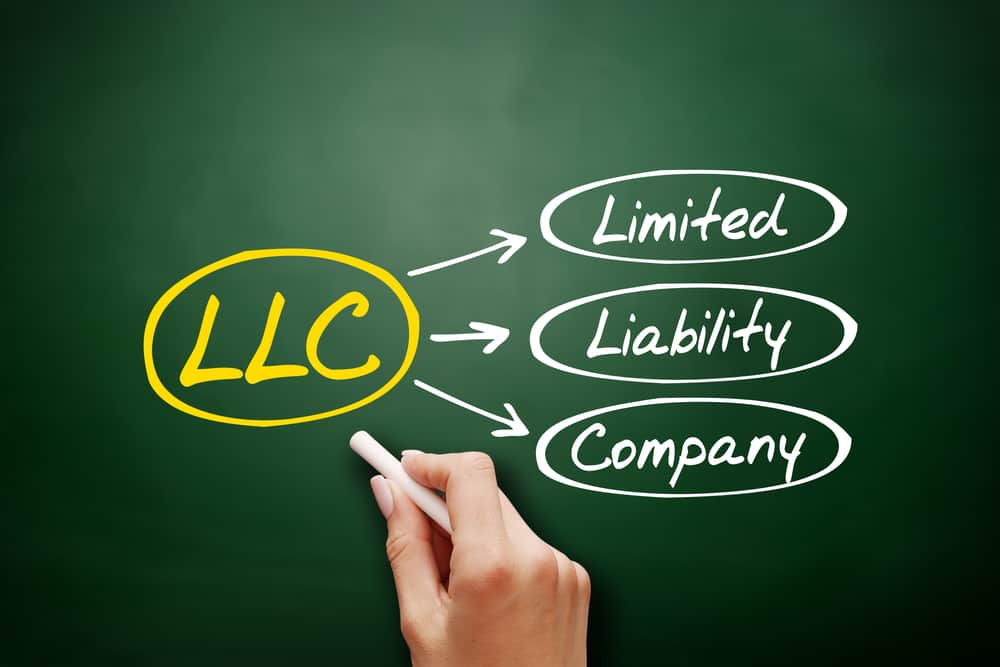Unlike other types of business entities, forming an LLC is a relatively easy and straightforward process. While there are many things you should take into account along the way, with the right help and organization, you can start an LLC in no time. If you’ve ever wanted to learn all the necessary steps for this process, our article on how to form an LLC will be very helpful.
We’ll start by defining what an LLC is and go through the most compelling advantages as well as some of the disadvantages associated with forming an LLC. Then, we’ll move on to detailed explanations of every step of forming an LLC to help you get a clear overview of what this process entails.
At the end of our article, you’ll find an informative FAQ section as well as a brief explanation of whether you should hire a lawyer. We’ll also share the typical costs of forming an LLC.
What Is an LLC?

First things first, let’s establish what an LLC exactly is.
An LLC is a business entity that provides limited liability, protecting its members from various claims, lawsuits, and debts. In case things go south with the business, the members’ possessions will be protected.
There are many reasons why people choose LLCs as opposed to other business entities. We’ll discuss some of the advantages and disadvantages of forming an LLC below.
Advantages of Forming an LLC
Limited Liability
The main reason why people decide to form an LLC concerns the main premise of this business entity; namely, creditors aren’t legally allowed to pursue members of the LLC in case of company debts. Therefore, all members are provided with legal protection, making LLCs an enticing prospect for new entrepreneurs.
When thinking about forming an LLC, it’s important to remember that there are certain exceptions where an LLC can lose its limited liability — a business phenomenon known as piercing the veil. Before starting an LLC, do your research and get informed about these and similar exceptions.
Pass-Through Taxation

When it comes to taxation, an LLC isn’t taxed on business income; rather, each of the owners pays taxes depending on their share of the profits of the LLC and their personal income. Many entrepreneurs prefer this pass-through taxation model that works on an individual level, and it’s one of the many benefits you can enjoy from forming an LLC.
Members
There isn’t a limit to the number of members an LLC can have, which is extremely appealing for those who aim to create large LLCs. This flexibility also extends to the type of members an LLC can have. Members can be individual entrepreneurs, other corporations, or even partnerships, leaving you with a wide pool of potential colleagues to choose from.
Easy to Set Up
Compared to some other business entities like S corps, LLCs are relatively easy to set up. The process is much more straightforward and often a lot cheaper than forming other types of corporations. The only thing you should keep in mind is that each state has its own laws regarding forming an LLC, so you need to consult an attorney or do a lot of research on your own.
Less Paperwork
Nobody likes doing paperwork, so it comes as no surprise that having less paperwork is one of the main selling points of LLCs. Since setting up an LLC is easier than setting up other corporations, there’s much less paperwork involved. Additionally, the paperwork that’s needed is a lot less convoluted than that of other types of companies.

Profit Distribution
Another major benefit associated with LLCs is flexible profit distribution. Owners aren’t required to distribute their profits equally or based on percentages, so it leaves a lot of leeway for negotiation and arrangements that work for all parties.
Disadvantages of Forming an LLC
LLCs Can Be Pricey
One of the main drawbacks when it comes to forming an LLC is the cost associated with it. While it’s definitely cheaper than forming other types of corporations, like an S corporation, it will definitely cost you a bit more than forming a sole proprietorship or a partnership.
Funding Opportunities
Similarly, it can be quite hard to find investors for LLCs because of the additional taxes. Ultimately, this affects the funding opportunities of the LLC, which is why this aspect can be a turn-off for some entrepreneurs.
How to Form an LLC
While the process of setting up an LLC might be less complex than that of other types of companies, there are quite a few steps you should be aware of. In this part of our article, we’ll provide detailed explanations of each step and the most important things you should keep in mind.
Decide on a State

The first step to forming an LLC is deciding which state you would like to form your LLC in. The good news is that you can form an LLC in any state. Generally speaking, the best way to go about it is to form an LLC in the state where you intend to do your business, i.e., create a domestic LLC. Foreign LLCs have their benefits, but they also come with higher administrative costs.
Each state has different laws and regulations regarding forming an LLC, which include cost and taxation. So, you’ll need to conduct some thorough research before deciding on a state, or you could hire a consultant who will give you all the details.
Apart from learning about the laws of forming an LLC, you’ll also want to get acquainted with the requirements regarding maintaining your LLC. This will help you ensure that you’re making the right decision.
In case you’d like to expand your business in the future to other states — by opening more offices, for instance — you would need to register your LLC as a foreign LLC in those states.
Name Your LLC
Now that you have chosen your state, it’s time to decide on a name for your LLC. When it comes to naming an LLC, there are a couple of rules you should be aware of. Like most legal entities, you must provide a unique name for your company. Another LLC can’t be registered in the same name.
If you’re unsure whether a company under that name exists, you can always check on the website of the state where your prospective LLC would be based. Additionally, you must include either the abbreviation LLC/ L.L.C or “Limited Availability Company” in its name. Certain words like Trust and State Department are completely off limits, while words like Bank require you to hire a professional as a member.
Just like forming an LLC comes with different laws depending on the state, so does naming. You’ll want to ensure you know the rules in the state where you’re planning on opening an LLC before deciding on a name.
Choose a Registered Agent
The next step is choosing a registered agent for your LLC. A registered agent, also known as an agent for service of process, is essentially an individual or a business that accepts legal documents and tax on your company’s behalf. These documents can be anything from notices to official correspondence.
When forming an LLC, you need to consult the state’s laws to find out whether it’s a legal requirement to choose a registered agent. In most states, it is essential.
Most LLC owners choose to hire a registered agent service. It’s possible to choose yourself as your company’s registered agent, but it’s much simpler to leave it to registered services.

Another thing you need to keep in mind is that the registered agent needs to be registered in the state where you’ll be doing your business and have a physical address in the same state.
File Articles of Organization
Next, you’ll need to file an article of organization form with your state’s business division or any other department that’s responsible for business filings. Articles of organization are also known as “certificates of formation” and “certificates of organization.” In the document, you’ll have to provide certain information like the name and the purpose of your business and information about your registered agent.
You can either fill out these documents yourself or, just like with registered agents, choose an LLC formation service that can complete the task on your behalf. If you have the means to do it, we recommend going for the latter.
The fees vary from state to state, so make sure you check that before moving on to the next step.
When your request is approved, you will receive a certificate that confirms the existence of your LLC as a legal entity in your chosen state.
LLC formation documents also require you to state whether your business will be member-managed or manager-managed. Ensure that you’ve weighed the pros and cons of each option.
Create an LLC Operating Agreement

The next step requires you to prepare an LLC operating agreement. You can either choose to have an oral agreement or a written one.
The operating agreement includes information about how the members of the LLC will manage the business, how the profits will be shared, and how new members can be added. It’s crucial for multi-member LLCs to have a thorough operating agreement to ensure that no misunderstandings occur in the future.
It also makes it easier for future investors to understand the intricacies of your business. Even if you’re creating a single-member LLC, having an operating agreement is advised in almost every country but is not required by law.
Apply for an EIN
Applying for an Employer Identification Number (EIN), also known as a Federal Tax Identification Number, is a requirement if you want to hire employees for your business or open a business bank account. The EIN will be used on your business’ bank accounts and tax filings. If you have a foreign LLC, you’ll need to apply for a sales tax identification number in every state where you’ll be conducting your business.
You can apply for an EIN in a couple of different ways. The easiest and most practical way is to do it online. All you have to do is fill out the application and send it to the authorities. You can also mail and fax your application, but it’ll take a little longer for you to get your EIN.
Get Acquainted with Tax Requirements
Some types of businesses are required to register for state tax. This depends on the purpose of your business as well as the state where your business is registered. Most LLCs either qualify for pull-through taxation or can be taxed as Sole Proprietorships, Partnerships, or even as an S-corp.
If you don’t want to spend hours learning about tax requirements, you can always hire an accountant who will help you with all things tax-related. Taxes vary from state to state, so if you have a foreign LLC, hiring an accountant can save you a lot of time and energy in the process.

How Much Does It Cost to Form an LLC?
A common question new entrepreneurs have is how much it costs to form an LLC. Generally speaking, the cost of the LLC will depend on the state in which the LLC is formed. The formation fees can cost anywhere from $50 to a couple of hundreds of dollars. Luckily, the information regarding the cost of forming an LLC in each state is readily available online.
When you find out the approximate cost, you will have to consider some other costs that come with forming an LLC, such as name reservation fees and license fees. In addition, there are maintenance fees as well, which you’ll have to pay every year.
Do I Need a Lawyer to Form an LLC?
There isn’t a legal requirement for you to hire a lawyer when forming an LLC. However, there are some perks associated with hiring a lawyer in this process. For instance, they can help you create an operating agreement and act like the company’s registered agent.
If your LLC has a lot of members, then consider hiring a lawyer. If, on the other hand, your LLC is a single-member LLC or is comprised of only a few members, then you can skip this step if your budget is limited.
How To Form An LLC In Each State
- Alabama
- Alaska
- Arizona
- Arkansas
- California
- Colorado
- Connecticut
- Delaware
- Florida
- Georgia
- Hawaii
- Idaho
- Illinois
- Indiana
- Iowa
- Kansas
- Kentucky
- Louisiana
- Maine
- Maryland
- Massachusetts
- Michigan
- Minnesota
- Mississippi
- Missouri
- Montana
- Nebraska
- Nevada
- New Hampshire
- New Jersey
- New Mexico
- New York
- North Carolina
- North Dakota
- Ohio
- Oklahoma
- Oregon
- Pennsylvania
- Rhode Island
- South Carolina
- South Dakota
- Tennessee
- Texas
- Utah
- Vermont
- Virginia
- Washington
- West Virginia
- Wisconsin
- Wyoming
- U.S. Virgin Islands
FAQs
Can You Start an LLC on Your Own?
Yes, you can start an LLC on your own or hire professional services that can help you along the way.
Who Can Form an LLC?
There aren’t many limitations when it comes to who’s allowed to form an LLC. With that said, some states impose certain laws in regard to who can form an LLC, such as being at least 18 years old, so you have to check with the state to ensure that you qualify to be an owner of an LLC.
How Many Members Do I Need to Form an LLC?
LLCs can be both single-member and multiple-member, so you don’t need other members if you want to start an LLC.
Is There a Limit to How Many Members an LLC can have?
No, there isn’t an upper limit to how many members your LLC has.
Final Thoughts
We hope you found our article on how to form an LLC helpful and that you feel ready to tackle this process.
There are many advantages that come with forming an LLC, such as having limited liability, qualifying for pass-through taxation, and being easy to set up, so it comes as no surprise that it’s an enticing business entity for many entrepreneurs. Likewise, there are some disadvantages that are associated with forming an LLC, like finding outside investors and being pricey.
Even though there are quite a few steps you need to go through when forming an LLC, the process is relatively straightforward. If you think you’ll find it tedious, you can always hire professional services that will help you in the process. If you wish to, you can even hire a lawyer who will guide you through all the legal intricacies of forming and maintaining an LLC, saving you a lot of time and energy in the process.
